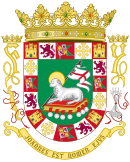
The politics of Puerto Rico take place in the framework of a democratic republic form of government that is under the jurisdiction and sovereignty of the United States Congress as an organized unincorporated territory. Since the 1898 invasion of Puerto Rico by the United States during the Spanish–American War, politics in Puerto Rico have been significantly shaped by its status as territory of the United States. The nature of Puerto Rico's political relationship with the United States is the subject of ongoing debate in Puerto Rico, in the United States, the United Nations and the international community, with all major political parties in the archipelago calling it a colonial relationship.

The government of the Commonwealth of Puerto Rico is a republican democracy established by the Constitution of Puerto Rico in 1952. Under a system of separation of powers, the government is divided among three branches: the executive, the legislative, and the judicial. As a territory of the United States, the government of Puerto Rico is under the jurisdiction of the federal government of the United States.

The Legislative Yuan is the unicameral legislature of the Republic of China (Taiwan) located in Taipei. The Legislative Yuan is composed of 113 members, who are directly elected for four-year terms by people of the Taiwan Area through a parallel voting system.
Unicameralism is a type of legislature consisting of one house or assembly that legislates and votes as one. Unicameralism has become an increasingly common type of legislature, making up nearly 60% of all national legislatures and an even greater share of subnational legislatures.
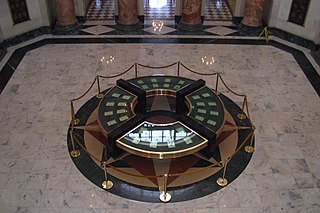
The Constitution of the Commonwealth of Puerto Rico is the primary organizing law for the unincorporated U.S. territory of Puerto Rico, describing the duties, powers, structures and functions of the government of Puerto Rico in nine articles. It was ratified by the electorate of the archipelago and island in a referendum on March 3, 1952 and proclaimed into effect by Governor Luis Muñoz Marín on July 25, 1952, celebrated as Constitution Day. As the constitution of a territory of the United States, it is bound by the Constitution of the United States.

The Puerto Rican Independence Party is a social-democratic political party in Puerto Rico that campaigns for the independence of Puerto Rico from the United States.
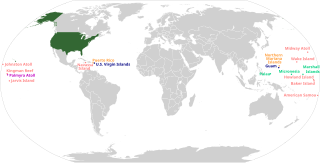
The term "51st state" in American political discourse refers to the idea of adding a new state to the Union, either by granting statehood to one of the U.S. territories, splitting an existing state, admitting another country, or granting statehood to Washington, D.C. This would increase the number of states in the United States from 50 to 51. The last state to be admitted was Hawaii in August 1959, preceded by Alaska, which became a state just months earlier in January 1959, and Arizona in February 1912.
In the politics of the United States, the process of initiatives and referendums allow citizens of many U.S. states to place legislation on the ballot for a referendum or popular vote, either enacting new legislation, or voting down existing legislation. Citizens, or an organization, might start a popular initiative to gather a predetermined number of signatures to qualify the measure for the ballot. The measure is placed on the ballot for the referendum, or actual vote.
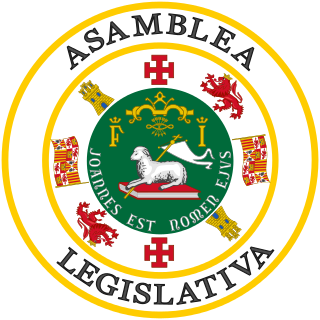
The Legislative Assembly of Puerto Rico is the territorial legislature of the Commonwealth of Puerto Rico, responsible for the legislative branch of the government of Puerto Rico. The Assembly is a bicameral legislature consisting of an upper house, the Senate normally composed of 27 senators, and the lower house, the House of Representatives normally consisting of 51 representatives. Eleven members of each house are elected at-large rather than from a specific legislative district with all members being elected for a four-year term without term limits.
The 2006 Puerto Rico budget crisis was a political, economic, and social crisis that saw much of the government of Puerto Rico shut down after it ran out of funds near the end of the 2005–2006 fiscal year. The shut down lasted for two weeks from 1 May 2006 through 14 May 2006, leaving nearly 100,000 public employees without pay and closing more than 1,500 public schools.

The Puerto Rico statehood movement aims to make Puerto Rico a state of the United States. Puerto Rico is an unincorporated territorial possession of the United States acquired in 1898 following the Spanish–American War, making it "the oldest colony in the modern world". As of 2023, the population of Puerto Rico is 3.2 million, around half the average state population and higher than that of 19 U.S. states. Statehood is one of several competing options for the future political status of Puerto Rico, including: maintaining its current status, becoming fully independent, or becoming a freely associated state. Puerto Rico has held seven referendums on the topic since 1967, and four since 2012. They are non-binding, as the power to grant statehood lies with the US Congress.
A referendum on the political status of Puerto Rico was held in Puerto Rico on November 6, 2012. It was the fourth referendum on status to be held in Puerto Rico. Puerto Rico has been an unincorporated territory of the United States since the Spanish–American War in 1898.
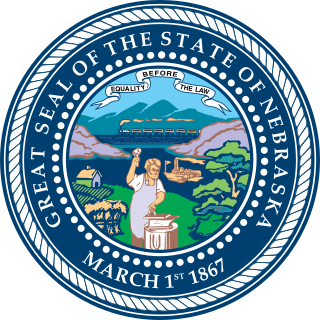
The Nebraska Legislature is the legislature of the U.S. state of Nebraska. The Legislature meets at the Nebraska State Capitol in Lincoln. With 49 members, known as "senators", the Nebraska Legislature is the smallest U.S. state legislature. A total of 25 members is required for a majority; however, in order to overcome a filibuster, a two-thirds vote of all members is required, which takes 33 votes.

A constitutional referendum was held in Puerto Rico on 19 August 2012. Voters were asked whether they approve of two amendments to the constitution: one to eliminate the absolute right to bail and the other to decrease the number of members of the Legislative Assembly. Despite support from the party in government and part of the main opposition party, both amendments were rejected by voters.

Proposed political status for Puerto Rico includes various ideas for the future of Puerto Rico, and there are differing points of view on whether Puerto Rico's political status as a territory of the United States should change.

The status quo movement in Puerto Rico refers to initiatives throughout the history of Puerto Rico aimed at maintaining the current political status of Puerto Rico, that of a commonwealth of the United States.
Three main alternatives are generally presented to Puerto Rican voters during Puerto Rico political status referendums: full independence, maintenance or enhancement of the current commonwealth status, and full statehood into the American Union. The exact expectations for each of these status formulas are a matter of debate by a given position's adherents and detractors. Puerto Ricans have proposed positions that modify the three alternatives above, such as (a) indemnified independence with phased-out US subsidy, (b) expanded political but not fiscal autonomy, and (c) statehood with a gradual phasing out of federal tax exemption.
A referendum on the political status of Puerto Rico was held in Puerto Rico on June 11, 2017. The referendum had three options: becoming a state of the United States, independence/free association, or maintaining the current territorial status. Those who voted overwhelmingly chose statehood by 97%. This figure is attributed to a boycott led by the pro-status quo PPD party, which resulted in a 22.93% turnout.

A referendum of the status of Puerto Rico was held on November 3, 2020, concurrently with the general election. The Referendum was announced by Puerto Rico Governor Wanda Vázquez Garced on May 16, 2020. This was the sixth referendum held on the status of Puerto Rico, with the previous one having taken place in 2017. This was the first referendum with a simple yes-or-no question, with voters having the option of voting for or against becoming a U.S. state. The New Progressive Party (PNP), of whom Vázquez is a member, supports statehood, while the opposition Popular Democratic Party (PDP) and Puerto Rican Independence Party (PIP) oppose it.

The Puerto Rico Status Act, H.R. 2757, was a bill introduced during the 116th United States Congress. The intention of the bill is to grant Puerto Rico, an unincorporated territory of the United States, admission into the Union as a state. The bill was originally introduced in the 116th Congress and was reintroduced as H.R. 1522, on March 2, 2021, in the 117th Congress. It was referred to the House Committee on Natural Resources with last action taken on June 16.
